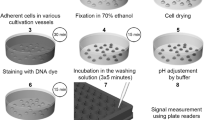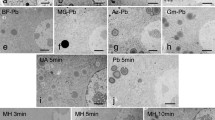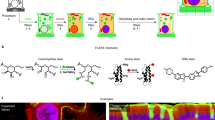Abstract
THE use of acridine orange and acridine orange R for histochemical observations on cellular and virus nucleic acids has been reported by Armstrong and Niven1. Their method has the advantage, compared with conventional staining methods, of increased sensitivity, sharp contrast between ribonucleic acid (RNA) and deoxyribonucleic acid (DNA) and uniformly reproducible results. Nucleic acid differentiation is based on the colours produced by the complex between dye and nucleic acid when activated by ultra-violet or blue violet light. The complex with RNA shows a red fluorescence, whereas with DNA the fluorescence is green.
This is a preview of subscription content, access via your institution
Access options
Subscribe to this journal
Receive 51 print issues and online access
$199.00 per year
only $3.90 per issue
Buy this article
- Purchase on Springer Link
- Instant access to full article PDF
Prices may be subject to local taxes which are calculated during checkout
Similar content being viewed by others
References
Armstrong, J. A., and Niven, J. S. F., Nature, 180, 1335 (1957).
Metcalf, R. L., and Paton, R. L., Stain Tech., 19, 11 (1944).
Author information
Authors and Affiliations
Rights and permissions
About this article
Cite this article
KEEBLE, S., JAY, R. Fluorescent Staining for the Differentiation of Intracellular Ribonucleic Acid and Deoxyribonucleic Acid. Nature 193, 695–696 (1962). https://doi.org/10.1038/193695a0
Issue Date:
DOI: https://doi.org/10.1038/193695a0
This article is cited by
-
Methylene-blue/Coriphosphine-O/Acridine-Orange, chromosomal DNA and visible light: Interaction and cytological effect in Drosophila melanogaster
Genetica (1981)
-
Light-induced banding (LIB) in metaphase chromosomes of Culiseta longiareolata (Diptera: Culicidae)
Genetica (1980)
-
Y chromosome in the sibling speciesAnopheles atroparvus (van Thiel, 1927) andA. labranchiae (Falleroni, 1926) (Diptera: Culicidae): Differential behaviour of the short arm after acid-alkaline treatment and Coriphosphine-O staining
Experientia (1979)
-
The structural organization of mouse metaphase chromosomes
Chromosoma (1977)
-
Nuclear and cytoplasmic DNA synthesis in cotton embryos: a correlated light and electron microscope autoradiographic study
Histochemie (1972)
Comments
By submitting a comment you agree to abide by our Terms and Community Guidelines. If you find something abusive or that does not comply with our terms or guidelines please flag it as inappropriate.



